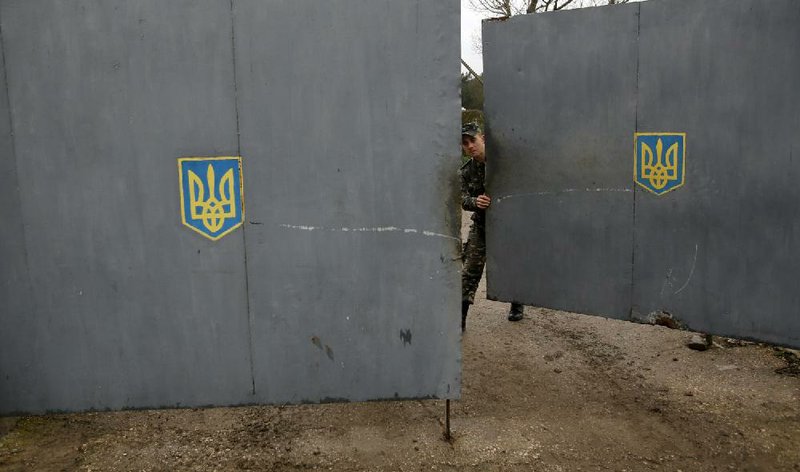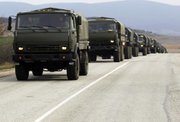MOSCOW - Even as Russia and Ukraine signaled a modest willingness Saturday to seek a diplomatic resolution to the widening crisis over Crimea,there were new reports of Russian reinforcements there, and Russia raised the possibility of suspending inspections required under arms-control treaties because of stepped-up operations by NATO.
RELATED ARTICLE
http://www.arkansas…">Analysts: Small circle of Putin aides opted for invasion
“We are ready to continue a dialogue on the understanding that a dialogue should be honest and partnerlike, without attempts to portray us as one of the parties in the conflict,” Russia’s foreign minister, Sergey Lavrov, said during an appearance with his counterpart from Tajikistan.
Hours after he spoke, however, Russia began moving new troops in unmarked uniforms in large trucks around Crimea, and a Ukrainian defense spokesman there said witnesses had reported seeing amphibious military ships unloading about 200 military vehicles in eastern Crimea on Friday after apparently having crossed the Strait of Kerch, which separates Crimea from Russian territory.
The Ukrainian spokesman said a convoy of about 60 military trucks was moving from Feodosiya toward an airfield near Simferopol, Crimea’s regional capital. A Ukrainian border-patrol plane also was fired on near the boundary between Crimea and Russia, the Ukrainians said, but without damage.
In Moscow, an unidentified military official told Russian news agencies that Russia was considering suspending American inspections of its nuclear arsenal required by the strategic arms-reduction treaties, as well as other military cooperation agreements meant to build confidence and avoid international confrontations.
The military inspections take place as part of the Strategic Arms Reduction Treaty between Russia and the U.S. that involves cutting the nuclear arsenals of both countries.
“As the inspections are a measure of trust and the U.S. has effectively declared sanctions, regular bilateral contact in accordance with the treaties is impossible,” the person in the Defense Ministry told Interfax.
The official said the move was justified by “baseless threats” against Russia by the United States and NATO. A suspension of the inspections would undermine a pillar of international security and expand the confrontation beyond Ukraine.
State Department spokesman Jen Psaki said the Russian government had not yet notified the United States of a decision but was expected to uphold its treaty obligations.
Although President Barack Obama has made clear that the United States does not want to escalate the Crimean crisis, the Pentagon stepped up training operations in Poland and sent fighter jets to patrol the skies over Lithuania, Latvia and Estonia, three former Soviet republics with sizable ethnic Russian populations.
Obama, who was spending the weekend in Florida, also held phone consultations about Ukraine with the French president and the British and Italian prime ministers, and then had a conference call with the presidents of Estonia, Latvia and Lithuania, which are NATO members.
He pledged that the United States, as a NATO ally, had an “unwavering commitment” to their defense, according to the White House’s account of the call.
The leaders agreed that Russia must pull its military forces in Ukraine’s strategic Crimea Peninsula back to bases it has there, allow access for international observers and human-rights monitors and form a contact group to begin holding direct talks between Ukraine and Russia to reduce tensions in the region, the White House said.
In his talks, Obama welcomed the unified position of the United States and the European Union on Russian actions in Ukraine, including by the European Council, which is made up of EU leaders.
In a separate phone conversation Saturday, Secretary of State John Kerry warned Lavrov that “continued military escalation and provocation in Crimea or elsewhere in Ukraine, along with steps to annex Crimea to Russia, would close any available space for diplomacy,” a U.S. State Department official said.
Speaking Saturday in a BBC interview, NATO Secretary-General Anders Fogh Rasmussen said that while there is no military response to the recent events in Crimea, the crisis was a reminder of threats to European security and stability.
“I do believe that politicians all over NATO will now rethink the whole thing about investment in security and defense,” he told the BBC. “Obviously, defense comes at a cost but insecurity is much more expensive.”
In Kiev, Ukraine’s new foreign minister, Andrii Deshchytsi, said that some small progress had been made to form a “contact group” of foreign diplomats to mediate the country’s confrontation with Russia after the occupation of Crimea by Russian soldiers and local “self-defense” groups more than a week ago.
Washington has sought to establish the contact group, which would include Russia, Ukraine, Britain, France and the United States, as a way to get Moscow and Kiev to the negotiating table.
Forming the group was an idea discussed Thursday during meetings between Ukraine’s prime minister and European Union leaders in Brussels.
Deshchytsi said he learned from mediators that Russia hasn’t “categorically” refused the idea of permitting a contact group to help broker an end to the dispute.
Crimea’s regional assembly voted Thursday to secede from Ukraine and apply to join the Russian Federation, and scheduled a referendum for March 16 to ratify its decision, significantly escalating the crisis between Russia and the West.
Ukraine, along with the United States and Europe, declared the referendum unconstitutional and made clear it would not recognize the Crimean vote, though the prospect of Crimea joining Russia received an overwhelmingly positive reaction from Russian lawmakers Friday.
“We have a certain small progress and some hope that we will manage this in a peaceful way,” Deshchytsi said in Kiev. “We need to create some negotiating mechanism” with Russia, “and we think it should be established as soon as possible.” He said Ukraine was open to talks with Russia in any setting “to stop the aggression and de-escalate the situation.”
But Lavrov did not budge from Russia’s position that the new government in Ukraine was illegitimate and under the sway of “radical nationalists” who seized power in a coup. He insisted that any talks with Europe or the United States should begin with the agreement signed Feb. 21 between the ousted Ukrainian president, Viktor Yanukovych, and opposition leaders to end the bloodshed in Kiev, even though that accord fell apart almost immediately.
The diplomacy is likely to be complicated, however, because Russian officials have refused to recognize Ukraine’s new political leaders, though the Russian and Ukrainian prime ministers have spoken and Deshchytsi said messages were being exchanged through intermediaries, presumably European and U.S. diplomats.
Even as Lavrov continued to denounce those Russia considers to be the radicals behind the ouster of Yanukovych’s government, the leader of a rightist group that figured prominently in the street protests staked a claim Saturday for a larger role in the political future of Ukraine. The group, Right Sector, has not disbanded its quasi-military units, whose members now at times appear armed in public and have become more vocally critical of the interim government in recent days.
A day after declaring himself a candidate for president in the election now scheduled for May, the group’s leader, Dmytro Yarosh, provided the most detailed description yet of his political ambitions and goals.
Yarosh said the Right Sector, which played a prominent role in last month’s protests and street battles, was not disbanding because it wanted to dissuade Russia from moving deeper into Ukraine.
“Ukraine is practically in a state of war with Russia,” he said, “and it is too early to speak of pacification and disarmament.”
In Crimea, tensions continued to mount despite the diplomacy. Poland evacuated its consulate in Sevastopol on Saturday “because of continuing disturbances by Russian forces there,” said the country’s foreign minister, Radoslaw Sikorski.
There were new reports of Russian military maneuvers Saturday, the morning after Russian troops tried to seize a Ukrainian air force base in the port of Sevastopol housing 100 soldiers. Two Russian military vehicles smashed through the gate of the base, but there were no shots fired and the vehicles withdrew.
An international military mission composed of officers from the U.S. and 28 other nations tried again Saturday to enter Crimea, but it was turned back by armed men near the town of Armiansk.
An AP reporter traveling with the 54 observers from the Organization for Security and Cooperation in Europe said that after the group had stopped, the armed men fired bursts from automatic weapons to halt other unidentified vehicles. No injuries were reported.
Deshchytsi said Russia should allow the observers in, as well as officials from the United Nations, as a first step to calming tensions in Crimea and creating the atmosphere for international mediation.
“Crimea is and will remain a Ukrainian land,” Deshchytsi said. He sought to ease fears of a military conflict, however, adding, “We will apply every effort to resolve this issue in a diplomatic way.”
In Simferopol, meanwhile, a public ceremony was held for the swearing-in of the first unit in the pro-Russia Military Forces of the Autonomous Republic of Crimea. About 30 men armed with AK-47s, and another 20 or so unarmed, turned out. They were sworn in at a park in front of an eternal flame to those killed in World War II.
Sergei Aksyonov, the Crimean prime minister, said their main role, at least until the referendum, would be to “keep the peace.”
Information for this article was contributed by Steven Lee Myers, Steven Erlanger, Andrew E. Kramer and Patrick Reevell of The New York Times; by Dalton Bennett, Yuras Karmanau, Dmitry Vlasov, Tim Sullivan, Mike Eckel, John-Thor Dahlburg,Vladimir Isachenkov, Danica Kirka, Matthew Lee and Darlene Superville of The Associated Press; and by Kathy Lally, Isabel Gorst and Carol Morello of The Washington Post.
Front Section, Pages 1 on 03/09/2014


